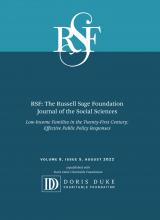Research Article
Open Access
Parenting Without Predictability: Precarious Schedules, Parental Strain, and Work-Life Conflict
Sigrid Luhr, Daniel Schneider, Kristen Harknett
RSF: The Russell Sage Foundation Journal of the Social Sciences August 2022, 8 (5) 24-44; DOI: https://doi.org/10.7758/RSF.2022.8.5.02
Sigrid Luhr
aVisiting assistant professor of sociology at the University of Illinois at Chicago, United States
Daniel Schneider
bProfessor of public policy at the Harvard Kennedy School and professor of sociology at Harvard University, United States
Kristen Harknett
cProfessor of sociology at the University of California, San Francisco, United States

REFERENCES
- ↵
- ↵
- Ananat, Elizabeth O.,
- Anna Gassman-Pines, and
- John A. Fitz-Henley II
- ↵
- Appelbaum, Eileen,
- Annette Bernhardt, and
- Richard Murnane
- ↵
- Barnett, Rosalind C.,
- Karen C. Gareis, and
- Robert T. Brennan
- ↵
- Ben-Ishai, Liz
- ↵
- Bianchi, Suzanne M.,
- Liana C. Sayer,
- Melissa A. Milkie, and
- John P. Robinson
- ↵
- Blair-Loy, Mary
- ↵
- Boushey, Heather
- ↵
- Bureau of Labor Statistics
- ↵
- Bureau of Labor Statistics
- ↵
- ↵
- Carrillo, Dani,
- Kristen Harknett,
- Allison Logan,
- Sigrid Luhr, and
- Daniel Schneider
- ↵
- Cherlin, Andrew J
- ↵
- Clawson Dan, , and
- Naomi Gerstel
- ↵
- Cohany, Sharon R., and
- Emy Sok
- ↵
- Collins, Caitlyn,
- Liana Christin Landivar,
- Leah Ruppanner, and
- William J. Scarborough
- ↵
- Cooper, Carey E.,
- Sarah S. McLanahan,
- Sarah O. Meadows, and
- Jeanne Brooks-Gunn
- ↵
- Craig, Lyn, and
- Brendan Churchill
- ↵
- Deater-Deckard, Kirby
- ↵
- Dilworth, Jennie E. Long
- ↵
- Doucet, Andrea
- ↵
- Eurofound
- ↵
- Fligstein, Neil, and
- Taek-Jin Shin
- ↵
- Gerstel, Naomi, and
- Dan Clawson
- ↵
- ↵
- Gordon, Rachel A.,
- Robert Kaestner, and
- Sanders Korenman
- ↵
- Greenwood, Shannon,
- Andrew Perrin, and
- Maeve Duggan
- ↵
- Hacker, Jacob
- ↵
- ↵
- Halpern-Meekin, Sarah, and
- Kristin Turney
- ↵
- Han, Wen Jui
- ↵
- Harknett, Kristen,
- Daniel Schneider, and
- Sigrid Luhr
- ↵
- Harknett, Kristen,
- Daniel Schneider, and
- Rebecca Wolfe
- ↵
- Heckman, James J
- ↵
- Henly, Julia, and
- Susan Lambert
- ↵
- ↵
- ↵
- Ishizuka, Patrick
- ↵
- Joshi, Pamela, and
- Karen Bogen
- ↵
- Kalleberg, Arne L
- ↵
- Kalleberg, Arne L
- ↵
- Kane, Emily
- ↵
- Karpman, Michael,
- Dulce Gonzalez, and
- Genevieve M. Kenney
- ↵
- ↵
- Kelly, Erin L., and
- Phyllis Moen
- ↵
- Kelly, Erin L.,
- Phyllis Moen, and
- Eric Tranby
- ↵
- Lambert, Susan
- ↵
- Lichter, Daniel T
- ↵
- ↵
- Lozano, Mariona,
- Dana Hamplová, and
- Céline Le Bourdais
- ↵
- Luhr, Sigrid
- ↵
- McLanahan, Sara
- ↵
- Milkman, Ruth
- ↵
- Miller, Claire C
- ↵
- ↵
- ↵
- Parker, Kim,
- Rachel Minkin, and
- Jesse Bennett
- ↵
- Perry-Jenkins, Maureen, and
- Naomi Gerstel
- ↵
- Pilarz, Alejandra Ros,
- Heather Sandstrom, and
- Julia R. Henly
- ↵
- Presser, Harriet
- ↵
- Presser, Harriet
- ↵
- Puff, Jayme, and
- Kimberly Renk
- ↵
- Rachidi, Angela
- ↵
- Raley, R. Kelly
- ↵
- Robertson, Campbell, and
- Robert Gebeloff
- ↵
- Roehling, Patricia V.,
- Lorna Hernandez Jarvis, and
- Heather E. Swope
- ↵
- Schieman, Scott,
- Paul Glavin, and
- Melissa A. Milkie
- ↵
- Schneider, Daniel
- ↵
- Schneider, Daniel, and
- Kristen Harknett
- ↵
- Schneider, Daniel, and
- Kristen Harknett
- ↵
- Schneider, Daniel, and
- Kristen Harknett
- ↵
- Schneider, Daniel,
- Kristen Harknett, and
- Matthew Stimpson
- ↵
- Seattle City Council
- ↵
- Shen, Shannon Leigh
- ↵
- Storer, Adam,
- Daniel Schneider, and
- Kristen Harknett
- ↵
- Usdansky, Margaret L., and
- Douglas A. Wolf
- ↵
- Wang, Wendy, and
- Kim Parker
In this issue
Parenting Without Predictability: Precarious Schedules, Parental Strain, and Work-Life Conflict
Sigrid Luhr, Daniel Schneider, Kristen Harknett
RSF: The Russell Sage Foundation Journal of the Social Sciences Aug 2022, 8 (5) 24-44; DOI: 10.7758/RSF.2022.8.5.02
Jump to section
- Article
- Abstract
- UNPREDICTABLE AND PRECARIOUS WORK
- DIFFICULTY ARRANGING CARE
- WORK-LIFE CONFLICT
- PARENTING STRESS
- FAMILY STRUCTURE AND RACE/ETHNICITY
- METHODS
- RESULTS
- HOW SCHEDULE INSTABILITY AFFECTS PARENTS
- INSTABILITY SCALE AND PARENTING CHALLENGES
- MODERATION OF SCHEDULE INSTABILITY AND PARENTING CHALLENGES
- CONCLUSION
- FOOTNOTES
- REFERENCES
- Figures & Data
- Info & Metrics
- References
Related Articles
- No related articles found.
Cited By...
- No citing articles found.





